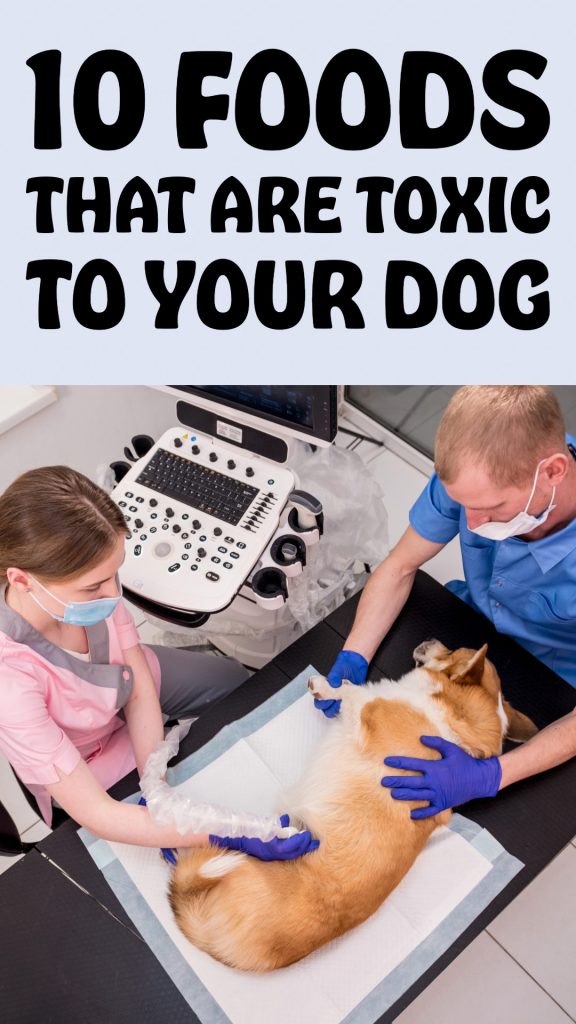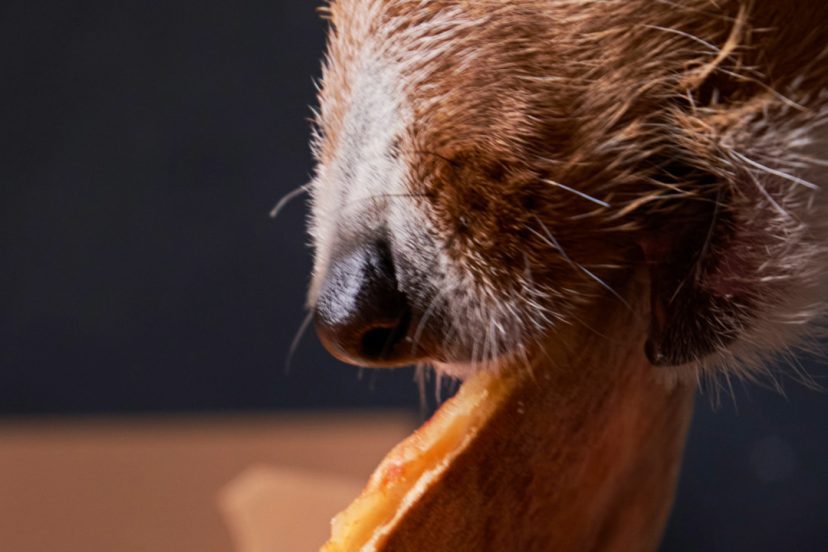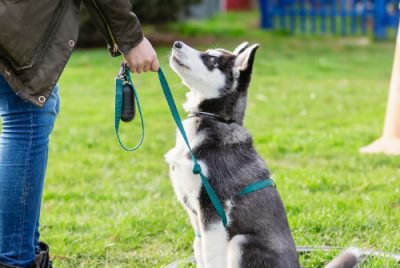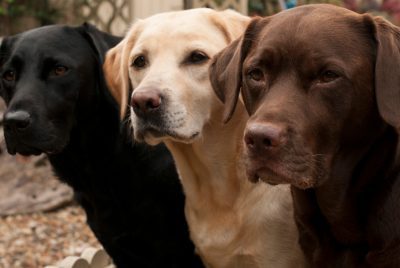Keep Your Dog Safe: Foods You Should Never Feed Them
Post Disclaimer
We may earn a commission for purchases made using our links. Please see our Disclaimer to learn more.
10 Human Foods Your Dog Should Never Eat
Key Highlights
- Dogs have different digestive systems than humans, and not all human foods are safe for dogs to eat.
- Some human foods, such as chocolate, avocado, grapes, onions, garlic, xylitol, alcohol, and caffeine, can be toxic to dogs and can cause serious health issues or even death.
- It is important to be aware of the signs of food poisoning in dogs, which include vomiting, diarrhea, difficulty breathing, and other symptoms.
- Preventive measures include avoiding feeding dogs harmful human foods, providing safe alternatives, and creating a dog-friendly meal plan.
- Frequently asked questions include what to do if a dog eats chocolate, if there are any human foods that dogs can safely eat, how to tell if a food is toxic to a dog, and the long-term effects of feeding dogs harmful foods.
- It is crucial to stay updated on the latest information regarding safe and unsafe foods for dogs to ensure their health and well-being.
Introduction
Dogs are often considered part of the family, and it’s natural for pet owners to want to share their food with their furry friends. However, not all human foods are safe for dogs to eat. In fact, some human foods can be toxic and even fatal to dogs, requiring immediate attention from an emergency vet. Understanding which foods are harmful to dogs is essential for every dog owner.
Dogs have different digestive systems than humans, and certain foods that are safe for us can be harmful or toxic to them. For example, chocolate, which is a favorite treat for many people, contains a substance called theobromine that is toxic to dogs. Even a small amount of chocolate can cause serious health issues in dogs, including increased heart rate, tremors, and even death. Other foods that may seem harmless to humans, such as almonds, can also be dangerous for dogs, especially those prone to heart disease. It is important for dog owners to be aware of these potential risks and avoid feeding their furry friends any human foods that could harm their health.
Other common human foods that can harm dogs include avocado, grapes and raisins, onions and garlic, xylitol (an artificial sweetener), alcohol, caffeine, and salty foods. These foods can cause various symptoms in dogs, from digestive problems to organ damage. It’s important for dog owners to be aware of these dangers and to keep these foods out of their pet’s reach.
This blog will explore 10 human foods that dogs should never eat. We will discuss the specific dangers of each food, why they are harmful to dogs, and how to recognize the symptoms of food poisoning in dogs. We will also provide preventive measures and safe alternatives to ensure your dog stays healthy and happy.
10 Human Foods to Avoid Feeding Your Dog
It is important for dog owners to be aware of the human foods that can harm their pets. Here are 10 foods that you should never feed your dog:
1. Chocolate – A Toxic Treat
Chocolate is toxic to dogs due to theobromine, a stimulant that affects their nervous and cardiovascular systems. The most dangerous types of chocolate for dogs are dark chocolate and unsweetened baking chocolate. Symptoms of chocolate poisoning in dogs include increased heart rate, restlessness, vomiting, diarrhea, tremors, rapid breathing, and elevated body temperature. In severe cases, it can lead to seizures, heart issues, bleeding, or death. If ingestion occurs, seek veterinary help immediately for treatments like inducing vomiting and providing supportive care. Prevent access to chocolate by keeping it out of reach.
2. Avocado – Risky For Their Health
Avocados are healthy for humans but can be toxic to dogs due to the substance persin found in the fruit, pit, leaves, and bark of the plant. Symptoms in dogs include vomiting, diarrhea, breathing difficulties, and even death from oxygen deprivation. The high-fat content can cause pancreatitis. It’s best to keep avocados away from your dog, as even small amounts can pose risks. If your dog shows symptoms after ingesting avocado, seek immediate veterinary care.
3. Grapes and Raisins – Danger of Kidney Failure
Grapes and raisins are highly toxic to dogs, potentially leading to kidney failure or even death. It’s uncertain what exact substance causes the toxicity, and effects can vary among dogs. To play it safe, avoid giving these fruits to your dog. Symptoms of ingestion include vomiting, diarrhea, abdominal pain, decreased appetite, and increased thirst/urination. Severe cases can result in kidney failure symptoms like lethargy, weakness, dehydration, and breathing difficulties. If you suspect ingestion, seek immediate veterinary care for treatment like induced vomiting or activated charcoal to prevent toxin absorption.
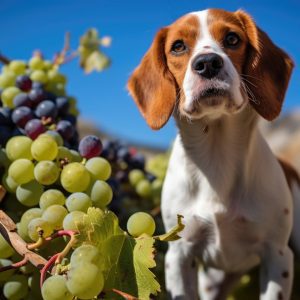
4. Onions and Garlic – Blood Cell Damage
Onions, garlic, leeks, and chives can harm dogs by damaging their red blood cells, leading to anemia. These vegetables contain compounds that can trigger Heinz body anemia in dogs, causing symptoms like weakness, pale gums, rapid breathing, and lethargy.
Even small amounts of onion or garlic can be toxic to dogs, including onion powder found in many foods. It’s vital to check the ingredients and avoid feeding your dog anything containing these substances.
If your dog shows signs of anemia after consuming onions or garlic, seek immediate veterinary care. Treatment may include oxygen therapy, supportive care for anemia, and close monitoring of the dog’s condition.
5. Xylitol – A Sweet Poison
Xylitol, found in sugar-free products, is safe for humans but toxic to dogs. Ingesting xylitol can cause a rapid drop in blood sugar levels in dogs, leading to severe symptoms like vomiting and seizures. Even small amounts can be harmful. Check product labels for xylitol before feeding your dog. If ingestion occurs, seek immediate veterinary care for induced vomiting or activated charcoal administration to prevent absorption and manage symptoms related to your dog’s blood sugar.

6. Alcohol – Not for Canine Consumption
Alcohol is highly toxic to dogs, causing symptoms like vomiting, diarrhea, and difficulty breathing. Even small amounts of alcohol can lead to heart arrhythmias, dangerously low blood pressure, or worse, and can be especially dangerous for dogs. Keep alcoholic beverages out of reach and seek immediate veterinary care if ingestion is suspected. Treatment may include inducing vomiting and providing supportive care.
7. Caffeinated Beverages – Harmful Stimulants
Caffeine is harmful to dogs and can cause symptoms like increased heart rate, restlessness, tremors, and seizures. Keep coffee, tea, energy drinks, and soda away from your dog. If consumption occurs, seek immediate veterinary care for treatment.
8. Dairy Products – Lactose Intolerance Issues
Some dogs can handle small amounts of dairy, but many are lactose intolerant. Lactose, a sugar in milk, is hard for dogs to digest as they lack the enzyme lactase. Consuming dairy can cause symptoms like diarrhea, vomiting, gas, and bloating due to lactose fermenting in the digestive system.
Monitor your dog’s reaction to dairy closely for signs of intolerance. If digestive issues occur, it’s best to avoid these products. Consult your vet for advice on safe dietary options if you suspect lactose intolerance in your dog.
9. Macadamia Nuts – Unknown Toxins
Macadamia nuts are highly toxic to dogs, causing symptoms like vomiting, weakness, tremors, and difficulty walking. Symptoms usually appear within 12 hours of ingestion and can last up to 48 hours. While most dogs recover without treatment, severe cases may need veterinary care. If your dog shows signs of macadamia nut poisoning, seek immediate veterinary assistance for treatment, such as inducing vomiting or administering activated charcoal.
10. Raw Meat and Eggs – Bacterial Risks
Raw meat and eggs pose a bacterial contamination risk to dogs, potentially causing food poisoning. Symptoms of consuming raw meat or eggs include vomiting and diarrhea. Cooking meat thoroughly and consulting with a vet before feeding a raw diet are crucial precautions to prevent illness.
Understanding the Dangers
Feeding dogs harmful human foods can seriously impact their health. Dogs have different digestive systems than humans, making certain substances toxic for them. These can disrupt bodily functions and lead to various health issues.
Why These Foods Are Harmful
Certain foods can harm dogs due to toxic substances that their bodies cannot process effectively. Their digestive systems differ from humans’, making some human foods difficult for them to digest. Choking hazards or blockages can also result from certain foods with small or hard components, like bones or pits. Dog owners must be cautious to prevent their pets from consuming harmful foods and should prioritize a balanced diet with the most common ingredients found in dog foods for their health and well-being.
Recognizing Symptoms of Food Poisoning in Dogs
Dogs can show various symptoms of food poisoning, including vomiting, diarrhea, and abdominal pain. Symptoms like difficulty breathing, tremors, weakness, and collapse may occur in severe cases. Dehydration, lethargy, and loss of appetite are also common signs. If you suspect your dog has consumed too much salt, seek immediate veterinary care for assessment and treatment.
Preventive Measures
Preventing dogs from consuming harmful human foods is vital for their health. Dog owners can take various measures to keep their pets safe. Avoid feeding dogs toxic foods like chocolate, avocado, grapes, onions, garlic from the allium family, xylitol, alcohol, and caffeine. Offer safe alternatives such as unsalted peanut butter, plain yogurt, and green beans. Ensure a balanced and suitable meal plan for their nutritional needs.
Safe Alternatives to Human Foods
Dogs can enjoy safe alternatives to human foods with similar tastes and textures. Unsalted peanut butter and plain yogurt are popular treats providing protein, healthy fats, probiotics, and calcium. Green beans, carrots, apples, bananas, cooked white rice, and lean meats like boiled chicken are also safe options. Avoid harmful seasonings and sauces. Offer these alternatives in moderation as part of a balanced diet tailored to your dog’s needs. Consult your veterinarian for guidance on suitable choices, and check out this list of foods safe for dogs for more ideas.
Creating a Dog-Friendly Meal Plan
Creating a balanced, dog-friendly meal plan is crucial for your pet’s health. Choose high-quality dog food rich in protein and essential fatty acids. Incorporate safe snacks like unsalted peanut butter and plain yogurt. Consult your vet for portion sizes and frequency recommendations.
Conclusion
Feeding human foods to your dog can be dangerous. Foods like chocolate, grapes, and xylitol can lead to severe health issues. Recognize food poisoning symptoms and offer safe alternatives. Stay updated on safe foods for dogs to ensure a healthy diet and prioritize their nutrition for a long, healthy life.
Frequently Asked Questions
What should I do if my dog eats chocolate?
If your dog eats chocolate, it is important to contact your veterinarian or the Pet Poison Helpline immediately. They can provide guidance on what steps to take based on the type and amount of chocolate your dog consumed. In severe cases, immediate veterinary care may be necessary.
Can dogs have any human foods safely?
While many human foods are unsafe for dogs, some can be given to them in moderation. Safe options include coconut oil, cooked white rice, and plain yogurt without added sugars or artificial sweeteners. However, it is best to consult your veterinarian before introducing new human foods to your dog’s diet.
How can I tell if a food is toxic to my dog?
Determining if a specific food is toxic to your dog can be difficult, as different foods can affect dogs differently. To be safe, it is best to consult a list of known toxic foods and monitor your dog for symptoms such as vomiting, diarrhea, difficulty breathing, and other signs of food poisoning. If you suspect that your dog has ingested a toxic food, contact your veterinarian or the animal poison control center for guidance.
What are the signs of food poisoning in dogs?
Common signs of food poisoning in dogs include vomiting, diarrhea, and lethargy. Other symptoms may include abdominal pain, loss of appetite, difficulty breathing, and changes in behavior. If you suspect that your dog has food poisoning, it is important to seek veterinary care.
Are there any safe amounts of these dangerous foods?
While some foods may be less toxic to dogs in small quantities, it is generally best to avoid feeding them dangerous foods altogether. The exact toxic dose can vary depending on the specific food and the size and weight of the dog. Feeding dogs dangerous foods can lead to serious health issues or even death, so it is best to err on the side of caution and avoid them completely.
How do I switch my dog to a safe and healthy diet?
Switching your dog to a safe and healthy diet can be done gradually to avoid digestive upset. Start by gradually introducing the new food alongside the current food, increasing the proportion of the new food over time. Choose a high-quality dog food that provides a balanced diet, and consult with your veterinarian for specific recommendations based on your dog’s age, size, and specific dietary needs. Incorporate safe and nutritious food items such as lean meats, fruits, and vegetables as appropriate.
Can certain breeds tolerate these foods better than others?
While certain breeds may have specific dietary needs or sensitivities, the harmful foods listed in this blog are generally toxic to all dogs regardless of breed. Dogs of all breeds can experience digestive problems and health complications from consuming these foods. It is important for all dog owners to be aware of these dangers and to take appropriate precautions.
What are the long-term effects of feeding dogs harmful human foods?
Feeding dogs harmful human foods can have long-term effects on their health. Chronic consumption of these foods can lead to conditions such as liver failure, kidney failure, and other organ damage. It is important to provide your dog a balanced and appropriate diet to ensure their long-term health and well-being.
Why is xylitol more dangerous than other sweeteners?
Xylitol is more dangerous than other sweeteners for dogs because it can cause a rapid drop in blood sugar levels, leading to hypoglycemia. Additionally, xylitol can cause liver failure in dogs, even in small amounts. Keeping all products containing xylitol out of your dog’s reach is important.
Can dogs recover from eating toxic foods?
The chances of recovery for dogs that have eaten toxic foods depend on several factors, including the type and amount of the toxic food ingested and the dog’s individual response. Many dogs can recover from food poisoning with prompt veterinary care and appropriate treatment. It is important to seek veterinary care immediately if you suspect that your dog has ingested toxic food.
What preventive measures can I take to avoid accidental ingestion?
To prevent accidental ingestion of harmful foods, it is important to pet-proof your home and be aware of potential dangers. Keep all toxic foods securely stored out of your dog’s reach. Be cautious when disposing of food waste, and ensure garbage cans and compost piles are securely covered. It is also important to educate yourself about the potential dangers of certain foods and to be mindful of what you and others in your household feed your dog.
Is there a difference in toxicity levels among the listed foods?
Yes, there is a difference in toxicity levels among the listed foods. Some foods, such as chocolate, are more toxic to dogs than others. The level of toxicity can vary depending on factors such as the type of food, the amount ingested, and the size and weight of the dog. It is important to be aware of the potential dangers of all the listed foods and to avoid feeding them to your dog.
How often should I check for updates on safe and unsafe foods for dogs?
It is important to stay informed about safe and unsafe foods for dogs. Updates on these lists may occur as new information becomes available. You should check for updates periodically or whenever you have concerns about a particular food. Resources such as the Pet Poison Helpline and reputable veterinary sources can provide updated information on safe and unsafe foods for dogs. Regular check-ups with your veterinarian can also help ensure you provide your dog a safe and healthy diet.
